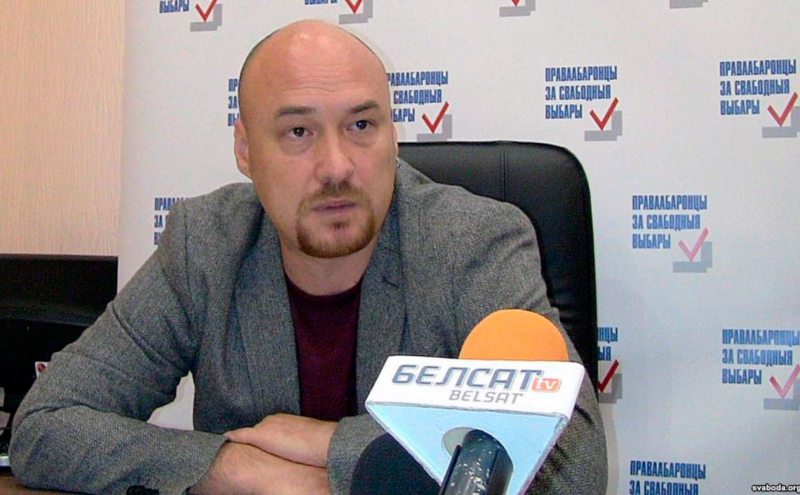Observers question campaigning equality
Valiantsin Stefanovich, expert of the campaign Human Rights Defenders for Free Elections, has been debating with Lidziya Yarmoshyna, head of the Central Election Commission, on the financial opportunities of potential candidates. The question is about the need for changes in legislation.
The campaign’s observers from across Belarus have noticed that during the collection of signatures for the nomination of potential candidates their election teams are actively using banners with the nominees’ portraits, the manufacture of which, obviously, requires certain material costs. Hence a question of violation of equality between the contenders. According to the observers, those nominees who are now using more perceptible visual products are likely to keep using them in the future, in particular at the stage of election campaigning, after the candidates have been officially registered. The observers view this situation as conducive to non-transparent financing of the candidates’ future campaigns.
What does the Electoral Code say to this? The issue of costs for the election is governed by Article 48. Part 10 of the Article prohibits future candidates to use money or other material assistance only in the cases listed in Part 9 of the same Article, i.e. foreign material and other aid. There are no other restrictions on the use of financial and other assistance from political parties, public associations, citizens or personal funds at the stage of collecting signatures. However, both NGOs and Belarusian citizens can only donate their money to the extra-budget fund, since, unlike in the presidential elections, a person applying for a deputy's mandate have the right to establish a special election fund only after their registration as a candidate, that is they cannot cover costs associated with the collection of signatures for their nomination.
Since the Electoral Code is not explicit about the funds used by nominees, Valiantsin Stefanovich asked the CEC to clarify provisions of the Electoral Code on the use of material resources for the production of information materials at the stage of collecting signatures, as well as the possibility of further use of these products during the campaigning phase.
Lidziya Yarmoshyna admitted in response that the above issues are not fully resolved by legal regulations, and noted that the Central Election Commission has no authority to regulate any issues until unless they are settled at the legislative level.
“In turn, the expansion of legal regulation in this area requires an analysis of the actual costs of the production of information material, stands, banners, as well as the degree of influence of this equipment on the will of the voters. Given that such equipment is, as a rule, provided to the nomination groups by public associations and free of charge, the Central Election Commission does not have any information that would allow it to make a well-reasoned opinion,” says the CEC head.
Ms. Yarmoshyna stresses that the Central Election Commission “holds the position in favor of simplifying the procedure of collecting signatures” and “eliminating artificial barriers to the nomination of candidates.”
While welcoming the CEC’s desire to simplify the procedures for the collection of signatures, increasing the number of places for picketing and other similar measures, Valiantsin Stefanovich says he is surprised at Lidziya Yarmoshyna’s statement that equipment is provided to election activists by public organizations on a pro bono basis.
“Public associations differ a lot. Some of them are financed from the state budget, while others from membership fees. This results in varying conditions for those who nominate their representatives,” Valiantsin Stefanovich said. “And we are pleased that the CEC is now liberal in its approach, that it does not insist on regulating procedures for signature collection pickets, but we remember when these approaches resulted in the CEC issuing a warning to a nominee only for laminating a poster in order to protect it from rain. And it should be emphasized that in this part the law has not changed.”
Taking into account all the facts mentioned, the human rights activist insists on the need to resolve the raised issues by the legislator:
“For the sake of equality of all persons who are nominated as candidates, the legislator should extend to parliamentary campaigns the rules introduced ahead of last year’s presidential election. It is necessary that both the nominees were given the right to establish a special election fund from the moment of registration of their nomination groups and that information on these funds was transparent, i.e. who and how much money has transferred to these funds.”
According to Stefanovich, the issue should be put before the legislature — the new members of the House of Representatives. The authorities have promised that after the current election they will return to the issue of implementation of the OSCE ODIHR recommendations into national legislation.
The campaign "Human Rights Defenders for Free Elections" is a non-partisan initiative and does not intend to support political parties and politicians. The entire election process is assessed solely on the basis of the principles of free, democratic and transparent elections, which can enable the people of Belarus to fully exercise their constitutional right to participate in the government of the country.



